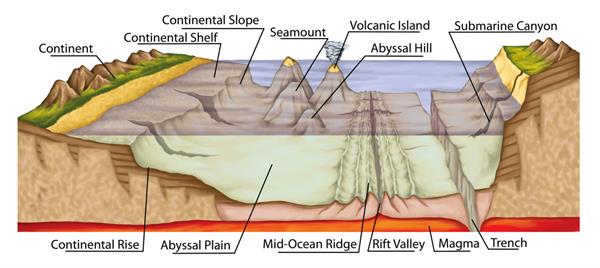
PUMPA - SMART LEARNING
எங்கள் ஆசிரியர்களுடன் 1-ஆன்-1 ஆலோசனை நேரத்தைப் பெறுங்கள். டாப்பர் ஆவதற்கு நாங்கள் பயிற்சி அளிப்போம்
Book Free DemoDo you want to climb the Earth's tallest mountain from its base to its peak? To do so, first, you should get into four miles deep into the Pacific Ocean to the seafloor. Measuring from just base to peak will show you that Mt. Mauna Kea (the Big Island of Hawaii) is nearly a mile taller than Mt. Everest. Mt. Mauna Kea measures 33,500\ feet\ from base to summit, whereas Mt. Everest measures only 29,035\ feet.
Beneath the ocean's smooth surface, there extends a complex underwater landscape similar to anything you might find on land. Like what we see in the movies and discovery channels, oceans are made up of a variety of landscapes i.e. the ocean water covers a considerable variety of landscapes very similar to that of the continents. Their reliefs range from mountains, plateaus, ridges, and basins to deep canyons and trenches beneath the ocean water. These relief features found on the ocean floor are called submarine relief. The ocean basins are characterised by the following major relief features:
- Continental shelf: Gently sloping seaward extension of the continental plate.
- Continental slope: Connects ocean basins and the continental shelf
- Continental rise: Gradually loses its steepness with depth.
- Deep-sea plain or Abyssal plain: Gently sloping areas of the ocean basins.
- Oceanic deep: Relatively steep-sided, narrow basins (Depressions)
- Oceanic ridge: Composed of two chains of mountains separated by a large depression.

Major relief features of Ocean
Let's have a detailed study on the above-mentioned features in the upcoming sections.